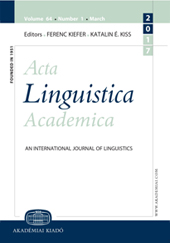The semantics of weak imperatives revisited: Evidence from free-choice item licensing
The semantics of weak imperatives revisited: Evidence from free-choice item licensing
Author(s): Tamás HalmSubject(s): Semantics
Published by: Akadémiai Kiadó
Keywords: imperatives; free-choice items; indefinites; semantics; pragmatics
Summary/Abstract: This paper provides a new analysis for the semantics and pragmatics of weak (permission/acquiescence) imperatives. In a significant modification to the To-Do-List (or minimal semantics – strong pragmatic) theory of imperatives (Portner 2007; 2012; von Fintel & Iatridou 2017), I argue that in weak imperatives, the utterance of the imperative is directed not at the To-Do-List of the addressee, but at a separate list which contains the set of possible courses of action contemplated by the addressee (which I term the List of Actions Under Consideration by the addressee). I support this claim by a new detailed analysis of free-choice item licensing in imperatives (based on the dependent indefinite analysis of FCIs put forth by Giannakidou 2001). I also show how my model correctly predicts that strong imperatives are felicitous out of the blue whereas weak imperatives need the prejacent to be already part of the context. It is also pointed out how this new approach helps us cut through the familiar controversy of whether weak imperatives can create obligations. Finally, I argue that the strong vs. weak imperative distinction is orthogonal to the degree of speaker endorsement (pace von Fintel & Iatridou 2017): this claim is also supported by a new look at data from Rhaetoromance (Poletto & Zanuttini 2003), where the strong vs. weak imperative distinction is encoded overtly on the morphosyntactic level in a binary fashion.
- Issue Year: 66/2019
- Issue No: 4
- Page Range: 445-489
- Page Count: 45
- Language: English

